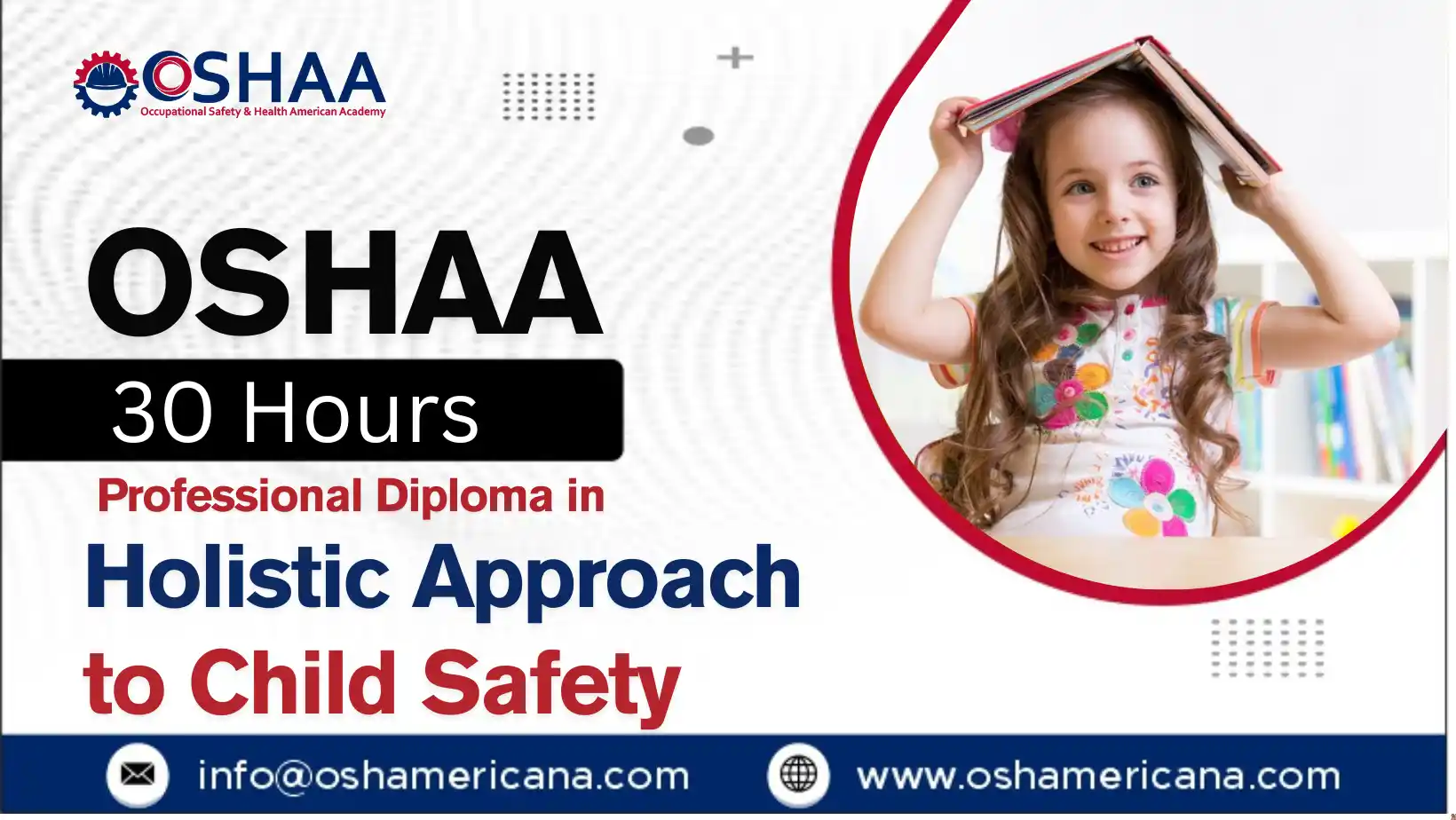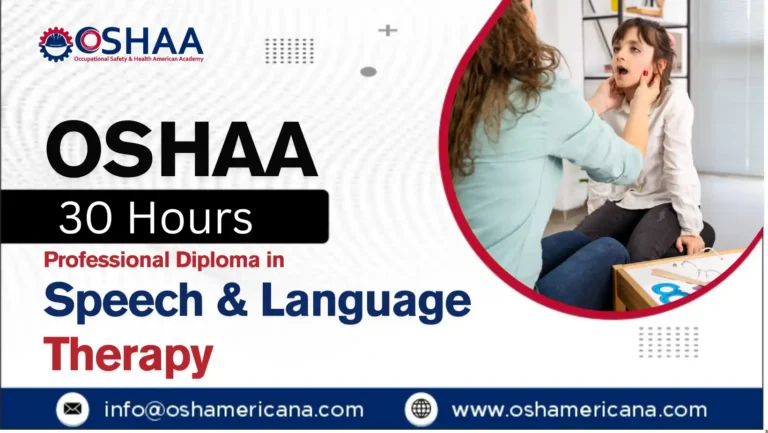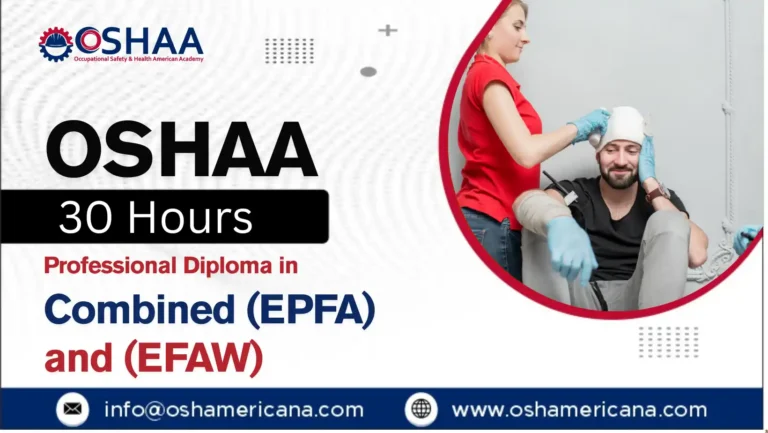OSHAA 30-Hours Intensive Professional Diploma in Child Safety Awareness and Intervention
In today’s complex and rapidly evolving world, the safety and well-being of children have become a top priority for educators, caregivers, and institutions. The OSHAA 30-Hours Professional Diploma in Holistic Approach to Child Safety is a specialised qualification designed to equip professionals with the essential knowledge and skills to create safer environments for children through a comprehensive and integrative approach.
This diploma course goes beyond the traditional framework of child safety by addressing multiple dimensions—physical, emotional, psychological, and social. It adopts a holistic model of safeguarding that not only prevents harm but also promotes overall child well-being. With a curriculum rooted in global safety standards and contemporary safeguarding practices, the programme is ideal for individuals working in education, childcare, social services, and related sectors.
This diploma course goes beyond the traditional framework of child safety by addressing multiple dimensions—physical, emotional, psychological, and social. It adopts a holistic model of safeguarding that not only prevents harm but also promotes overall child well-being. With a curriculum rooted in global safety standards and contemporary safeguarding practices, the programme is ideal for individuals working in education, childcare, social services, and related sectors.
The OSHAA 30-Hours Professional Diploma in Holistic Approach to Child Safety is more than just a training course—it is a transformative learning experience that empowers professionals to become champions of child safety. By adopting a holistic perspective, participants can foster environments where every child feels safe, supported, and able to thrive. Whether you are looking to upgrade your skills or fulfil safeguarding requirements in your field, this diploma offers a robust foundation for making a meaningful difference.
OSHAA 30-Hours Professional Diploma in Holistic Approach to Child Safety
Study Units
Learning Outcomes
Foundations of Child Safety and Holistic Safeguarding Principles (3 Hours)
Define the key concepts of child safety and safeguarding
Explain the principles of a holistic approach to child protection
Recognise the importance of integrating physical, emotional, and social safety
Identify roles and responsibilities in safeguarding across different settings
Understanding Child Development and Its Role in Safety Planning (4 Hours)
Describe major stages of child development and their safety implications
Assess how developmental needs influence risk and protective factors
Apply knowledge of child development to design age-appropriate safety measures
Recognise behavioural signs that may indicate underlying safety concerns
Identifying and Responding to Abuse, Neglect, and Exploitation (4 Hours)
Identify the types, signs, and indicators of abuse, neglect, and exploitation
Analyse factors contributing to child vulnerability and risk
Apply appropriate procedures for disclosure, referral, and intervention
Demonstrate understanding of professional boundaries and child protection ethics
Creating Safe Physical and Emotional Environments for Children (3 Hours)
Design strategies to promote safety in physical settings
Foster emotionally supportive environments that build resilience
Recognise the impact of environment on behaviour and well-being
Implement positive behaviour support techniques aligned with safeguarding goals
Child-Centred Risk Assessment and Emergency Preparedness (5 Hours)
Conduct comprehensive, child-focused risk assessments
Prioritise children’s needs and perspectives in safety planning
Develop effective emergency and response plans in line with safeguarding policies
Evaluate and adjust safety strategies through continuous monitoring
Mental Health, Trauma-Informed Care, and ACEs Awareness (4 Hours)
Understand the effects of trauma and adverse childhood experiences (ACEs)
Identify early signs of mental health concerns in children
Apply trauma-informed practices to support affected children
Promote psychological safety and access to mental health resources
Policies, Legal Frameworks, and Ethical Responsibilities in Child Protection (5 Hours)
Understand national and international child protection legislation
Interpret key safeguarding policies and procedures within professional practice
Uphold ethical standards in decision-making and care delivery
Recognise legal obligations for reporting and protecting vulnerable children
Effective Communication and Reporting Procedures in Safeguarding (2 Hours)
Develop clear and appropriate communication with children and families
Report safeguarding concerns in line with organisational and legal protocols
Maintain accurate, confidential, and factual documentation
Collaborate effectively with multi-agency teams through shared information practices
- Equips professionals with a well-rounded understanding of child safety through a holistic safeguarding framework
- Enhances capacity to identify, prevent, and respond to abuse, neglect, and exploitation in various child-focused environments
- Strengthens skills in mental health awareness, trauma-informed care, and child-centred risk assessment
- Aligns with national and international child protection legislation, increasing legal and ethical compliance
- Improves communication, reporting, and inter-agency collaboration for effective safeguarding practices
- Builds professional confidence in managing real-life safeguarding challenges with competence and sensitivity
- Offers a recognised qualification that adds value to professional profiles across education, healthcare, social care, and community services
- Provides flexible, structured learning suitable for busy professionals
- Encourages the creation of safe, inclusive environments that support the physical, emotional, and psychological well-being of children
- Supports continued professional development and opens pathways to advanced study or leadership roles in child welfare and protection
The OSHAA 30-Hours Professional Diploma in Holistic Approach to Child Safety is designed for professionals and individuals who are responsible for the care, protection, and well-being of children. It is particularly suitable for:
- Teachers, teaching assistants, and school leaders in primary and secondary education
- Early years practitioners, nursery staff, and childcare providers
- Social workers, family support officers, and child welfare professionals
- Healthcare professionals working with children and young people
- NGO and humanitarian workers involved in child protection and community development
- Law enforcement officers and juvenile justice personnel engaged in child safeguarding
- Foster carers, youth mentors, and residential care staff
- Counsellors, psychologists, and mental health practitioners supporting children
- Volunteers and staff in faith-based and community organisations working with children
- Anyone seeking to enhance their understanding and practice of child safety in professional or voluntary roles
This diploma is ideal for both experienced professionals and those entering the field who wish to build a strong foundation in safeguarding from a holistic, child-centred perspective.







